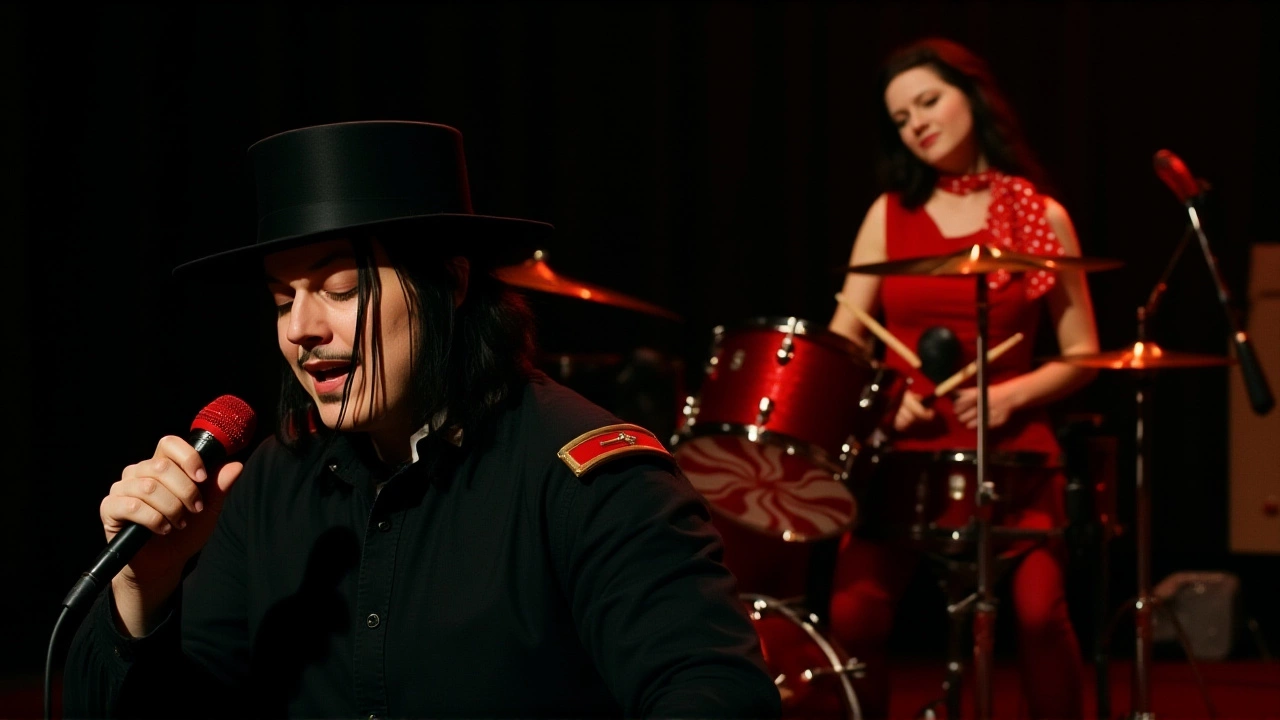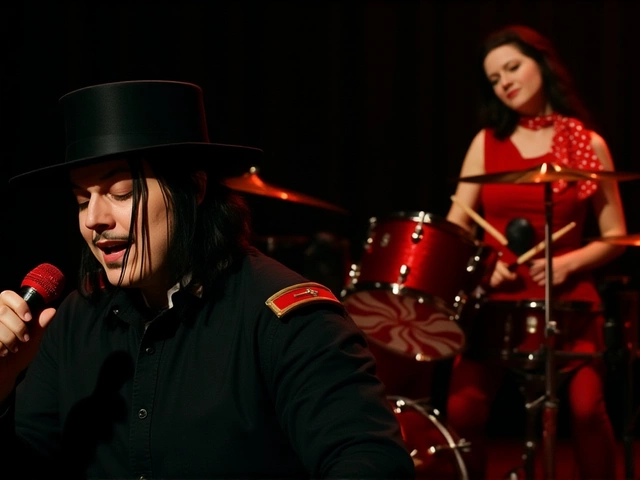On November 9, 2025, at 0:02:01 UTC, The Rock & Roll Hall of Fame inducted The White Stripes into its hallowed ranks — a moment that felt less like a coronation and more like a quiet, sacred reckoning. Jack White, the band’s guitarist, vocalist, and co-founder, stood alone on stage, accepting the honor on behalf of a duo that had long ago stopped performing together. His speech wasn’t just an acceptance — it was a love letter, a confession, and a hymn to the woman who wasn’t there: Meg White.
The Speech That Broke the Internet
White’s acceptance, captured in a 2-minute, 1-second video published by the Hall’s official YouTube channel, began with a surreal, almost poetic allegory. He described a "float" rolling through a corridor, pulled by white horses — or maybe a red Econoline van. The imagery was unmistakable: the early days of The White Stripes in Detroit, playing on street corners, in basements, in bars where no one knew their names. "Some people cheered," he said. "Some laughed. Some even threw stones." But then, one person smiled. "And the boy and the girl looked at each other and they also smiled," White continued. "And they felt they both felt the sin of pride. But they kept on smiling. Smiling from a new freedom... it wasn’t just a stranger, it was God." He paused. The room held its breath. Then, softly: "My sister thanks you and I thank you." It was the first time he’d publicly called Meg "my sister" in a formal setting — a deliberate choice, given their divorce in 2000, and the fact that she hadn’t performed with him since 2011. The phrase carried weight. It wasn’t just familial. It was spiritual. It was an acknowledgment that their music — raw, minimalist, hypnotic — was born not from ambition, but from something deeper: a silent, unspoken understanding between two people who spoke in rhythm, not words.Why Meg Wasn’t There
Meg White’s absence wasn’t a surprise. She’s been out of the public eye for over a decade, living quietly in Michigan. She rarely gives interviews. She doesn’t use social media. But fans had hoped — maybe even prayed — she’d show up. The YouTube video’s description included a viewer comment that summed up the collective ache: "I figured Meg wouldn’t be there :( I’m kinda sad about it." The Rock & Roll Hall of Fame, headquartered in Cleveland, Ohio, has inducted artists since 1983. This year marked its 40th anniversary. The White Stripes — formed in Detroit, Michigan in 1997 — were one of the most unlikely acts to ever make it in. Two people. One guitar. One drum kit. No bass. No keyboards. Just Jack’s blues-drenched riffs and Meg’s primal, heartbeat-like beats. They didn’t fit the mold. They didn’t want to. And yet, they changed rock music.The Legacy of a Garage Band That Became a Movement
Their 2001 album White Blood Cells was a revelation. It sounded like it was recorded in a basement — because it was. Their 2003 album Elephant, featuring the global hit "Seven Nation Army," became an anthem — played in stadiums, on protest marches, in sports arenas. The song’s bassline? That was Jack playing a guitar through a fuzz pedal. No bassist. Just genius. They didn’t tour often. They didn’t do interviews. They didn’t chase fame. And yet, they became icons. Their aesthetic — red, white, and black — wasn’t just fashion. It was philosophy. Minimalism as rebellion. Silence as power. White’s speech didn’t mention any of that. He didn’t list awards or sales figures. He didn’t name producers or engineers. He didn’t thank the industry. He told a story. About a boy and a girl. About strangers. About God. About pride. About joy.What This Means for Rock History
The induction of The White Stripes isn’t just about recognizing a great band. It’s about validating a way of making music that’s been increasingly erased: the DIY, the unpolished, the emotionally raw. In an age of auto-tune, algorithm-driven playlists, and viral TikTok trends, their induction is a quiet act of defiance. White’s closing line — "Get your hands dirty and drop the screens and get out of your garage" — wasn’t just a quote. It was a mission statement. It was a challenge to every kid with a guitar and a drum set in their bedroom: Don’t wait for permission. The ceremony wasn’t broadcast live. It was released on Disney+ on the same day. No red carpet. No celebrity cameos. Just Jack, a microphone, and a memory. That’s how they always did it.What’s Next?
There are no reunion plans. No new albums. No tour announcements. Meg White has made it clear she’s done with the spotlight. Jack White, meanwhile, continues to record — solo, with The Raconteurs, with The Dead Weather — always pushing boundaries. But this moment? This was different. It wasn’t about music. It was about legacy. About gratitude. About the quiet, stubborn love between two people who made something beautiful, even when the world didn’t understand it.Frequently Asked Questions
Why did Jack White refer to Meg White as 'my sister' instead of 'ex-wife'?
Jack White and Meg White divorced in 2000, but their musical partnership continued for another decade. By calling her 'my sister,' Jack deliberately shifted the narrative from romantic history to artistic kinship. The term underscores that their creative bond transcended marriage — it was rooted in shared intuition, not legal ties. This language also respects Meg’s privacy, avoiding public rehashing of their personal life while honoring her irreplaceable role in their sound.
How did The White Stripes influence modern rock music?
The White Stripes proved that minimalism could be powerful. Their stripped-down duo format — guitar and drums only — inspired countless indie and garage rock bands, from The Black Keys to Arctic Monkeys. They revived blues-rock with raw energy, rejecting polished production in favor of analog warmth. Their aesthetic and ethos became a blueprint for authenticity in an increasingly digital music landscape, showing that emotional truth matters more than technical perfection.
Why was the ceremony streamed on Disney+ instead of broadcast live?
The Rock & Roll Hall of Fame has increasingly moved away from traditional TV broadcasts in favor of streaming platforms to reach younger audiences. Disney+ offers global access and on-demand viewing, aligning with The White Stripes’ DIY ethos — no flashy spectacle, just the music and the message. The decision also reflects a broader industry shift: fans now want control over when and how they experience moments like this, not when networks decide to air them.
What does Meg White’s absence say about the Rock Hall’s approach to inductees?
The Hall has long struggled with how to handle absent or reluctant inductees. While some artists refuse to attend, others — like Neil Young and David Bowie — have been honored posthumously. Meg White’s absence isn’t a snub; it’s consistent with her lifelong preference for privacy. The Hall’s decision to proceed without her, and to let Jack speak for both, signals a maturing understanding: legacy isn’t about appearances. It’s about impact. And Meg’s impact is undeniable, even if she never wanted the spotlight.
Is there a chance The White Stripes will reunite after this induction?
Almost certainly not. Both Jack and Meg have repeatedly stated they have no interest in reuniting. Jack has focused on solo projects and other bands, while Meg has retreated entirely from public life. The induction wasn’t a call to return — it was a thank you. A final bow for a chapter that ended not with a bang, but with silence. And sometimes, silence is the loudest thing of all.

